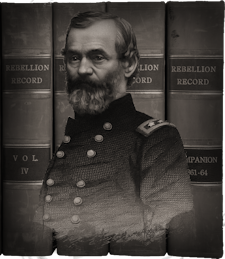February 6.—Fort Henry, on the Tennessee River, was taken by the squadron of gunboats, commanded by Flag-Officer A. H. Foote.
In consequence of the efforts of the enemy to reenforce the garrison, information of which had been received by General Grant, that officer determined, last night, to attack the fort to-day, although his troops had not then come up, and he issued orders accordingly.
The First division, under General McClernand, was ordered to move at eleven o’clock this morning, and occupy the roads leading to Dover and Donelson, for the purpose of cutting off the retreat of the garrison, as well as to prevent the enemy from throwing reinforcements into the fort. The First and Second brigades of the Second division were ordered to take and occupy the high grounds on the west bank of the river, which commanded the works. The Third brigade of the Second division was ordered to advance up the eastern bank of the river, as rapidly as possible, and to hold itself in readiness to act as circumstances might require, either in assaulting the works or in supporting the First division.
In the mean time, the gunboats were prepared for action, and at half-past twelve o’clock this morning, Flag-Officer Foote opened a fire on the enemy’s works, at seventeen hundred yards distance, from the iron-clad gunboats Cincinnati, (flag-ship,) Commander Stembel; Essex, Commander Porter; Carondelet, Commander Walke; and St. Louis, Lieut. Commanding Paulding. The old gunboats Conestoga, Lieut. Commanding Phelps; Tyler, Lieut. Commanding Gwin; and Lexington, Lieut. Commanding Shirk, forming a second division, also accompanied the assailing squadron, taking position astern and in-shore of it The First division, composed of the iron-clad gunboats, approached the fort in a parallel line, the Second division following at a short distance, and, as they slowly steamed up the river, the fire on both sides was warmly and skilfully conducted.
At about half-past one the Essex received a shot in her boiler, which resulted in the wounding and scalding of twenty-nine officers and men, including Commander Porter; when she necessarily dropped astern, out of the line, and took no further part in the action.
The firing continued with unabated rapidity and effect, as the three forward vessels approached the works, until a quarter before two o’clock, when the enemy ceased his fire, lowered his colors, and surrendered to the naval officers, to which arm of the service alone — the land forces not having participated in the action — the honor belonged.
The works were very finely situated; and twenty pieces of artillery, mostly of heavy calibre, were mounted for their defence. These, together with barracks and tents capable of accommodating fifteen thousand men, a hospital-ship, containing sixty invalids; General Tilghman and some sixty or seventy men, and quantities of stores, etc., fell into the hands of the victors. The main body of the garrison escaped before the works were occupied by the victors.
General Grant arrived at the fort within an hour after it had been surrendered, when Flag-Officer Foote gave up the fort and his prisoners, into the hands of the land forces, and, after having despatched Lieutenant Phelps, with the Conestoga, Tyler, and Lexington up the river, in pursuit of the enemy’s gunboats, the Flag-Officer, with the Cincinnati, Essex, and St. Louis, returned to Cairo.
The Cincinnati received, during the action, thirty-one shots, and lost one man killed and nine wounded; the Essex received fifteen shots, and lost one man, exclusive of these injured by the escape of steam; the St. Louis received seven shots, and the Carondelet six, neither of them sustaining any loss of men.—(Doc. 28.)
—President Lincoln approved the bill authorizing the Secretary of the Interior to strike from the pension rolls the names of all such persons as have, or may hereafter, take up arms against the Government of the United States, or who have, in any manner, encouraged the rebels or manifested a sympathy with their cause.
—In the United States House of Representatives, the Treasury Demand Note Bill, with the “legal tender” clause included, was passed by a vote of ninety-three to fifty-four, substantially in the form in which it came from the hands of the Committee. The bill provides for the issue, by the Secretary of the Treasury, of demand notes to the amount of one hundred and fifty millions of dollars, which notes are to be received as a legal tender for all purposes.



